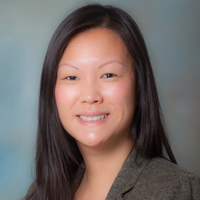Tina Rulli: Examining ethics of science and tech
Using DNA to engineer an island full of dinosaurs like in Jurassic Park sounds like far-fetched science fiction, but engineering the genetic makeup of animals, and even human embryos, is already possible. As science pushes forward, ethicist and philosophy professor Tina Rulli sees this technology as a hot spot of moral issues, and wants society to take a step back to decide whether it’s good or bad before people use it.

“We want to be able to give some sort of theoretically rigorous advice to those practitioners [doctors, nurses, genetic counselors] who have to get their hands dirty and have to make these really difficult decisions,” she said.
Rulli approaches ethics from both a theoretical and applied angle. On the theoretical side, she looks at normative ethics, the study of what the right thing to do is and how we should act. On the applied side, she studies bioethics, where she applies philosophical arguments to biological issues like whether a new biotechnology should be used.
Untangling Paradoxes
Rulli focuses on the moral value of creating new lives versus saving existing lives with genetic technology. Procedures that remove genetic defects from embryos are marketed as “life-saving” because they edit out genetic defects in new children. But she thinks using this description is wrong, because the technology is involved in creating new lives rather than saving people who already exist and have the defects.
“When we add new people to a scenario,” she said, “we run into a whole host of paradoxes that we’ll have to get untangled. Any theory of morality has to tell us how to count the good and the bad of new lives that we add to a scenario.
“If there’s a baby drowning in the pool and you jump in and pull the baby out, you’ve saved a life,” she said. “If you throw a baby into the deep end of the pool and then jump into the pool to take the baby out of the deep end, it’s not clear that you’ve unequivocally saved a life. That’s what we’re doing with these technologies. The whole value of the technology is to create children [who are] genetically-related to the mother.”
To Rulli, this value is insignificant. Much of her early research looked at the value of adopting a child versus creating a biologically related one; she concluded that the benefits of adopting greatly outweighed any benefits of having a biological child.
“This idea that it’s best to be biologically related to your children is problematic. It puts far too much emphasis on genetic determinist views on how our personalities emerge that isn’t empirically accurate. It doesn’t turn out to have much moral significance at all,” she said.
She has also looked at whether or not it’s worth investing in three-person in vitro fertilization, a genetic engineering process to help women with mitochondrial disease have healthy biological children.
She hopes to turn her research toward the ethics of CRISPR, a cutting-edge technology that has made headlines for its potential to edit genomes. The U.S. Senate Committee on Health, Education, Labor, and Pensions held a hearing about the ethics of this technology, which is rapidly becoming mainstream, in November 2017. Rulli wants to focus on whether it should be used to spread infertility in mosquito populations to help eradicate malaria.
A Major to Hold Onto
Rulli first got interested in philosophy from a University of Colorado at Boulder summer program that introduced philosophy to high schoolers. It gripped her because it was the most challenging thing she had ever encountered. She ended up double-majoring in philosophy and German at the University of Denver. “I was going to be a first-generation college student and I felt like this gave me something to hold onto,” she said. “I bet I’m one of the only first-generation college students who entered college knowing I’d be a philosophy major.”
She then went to graduate school at Yale University, where she studied both normative and applied ethics. She was introduced to bioethics during a postdoctoral fellowship at the National Institutes of Health in the bioethics department. She started her career as an assistant professor at Purdue University before joining UC Davis in 2014.
Rulli teaches “Intro to Bioethics,” (PHI 15), “Ethical Theory: Normative Ethics” (PHI 116), “Bioethics” (PHI 121), and graduate seminars on the ethics of killing, population ethics, and limiting the demands of morality (PHI 214).
When not teaching and researching, Rulli likes to draw and paint, cook vegan food, and take care of her two cats. “They are like my children,” she said. “It always sounded embarrassing [when people would say that kind of thing], but now I know what it’s like.”
What keeps Rulli coming back every day is her love of interacting with students at UC Davis. “UC Davis students are fantastic,” she said. “They are smart, driven, hard-working people, many of them first generation, many of them holding down a job on the side. They’re smart, they’re inquisitive, my office hours are filled; I love it. They keep me excited and inspired. It’s a great place.”